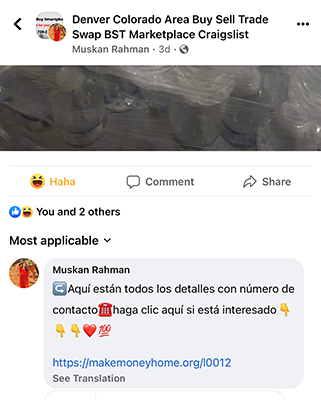The Most Popular Facebook Scams to Watch Out For
Ticketing Scams & Ticket Facebook Groups
Here are some common scams to watch out for when buying or selling tickets on Facebook:
Strange payment methods: Be wary of sellers or buyers who pressure you to use apps or family and friends on PayPal.
Suspicious profiles: Check the age and activity of the account you are buying from. Make sure they have real likes and friends.
Lack of references or reviews: Ask for references or check the person's buyer ratings on the marketplace.
Red flags: Look out for any suspicious behavior or warning signs. If you catch one or more red flags, consider finding another way to get the tickets.
Compromised accounts: The photo or name behind the account may be real, but the account may have been hacked. If you can, check with the account's friends to see if the account is still active.
Remember to always be cautious when buying or selling tickets on Facebook. It's important to double check the profile and payment methods, and to look out for any red flags.
Puppy Scams
Beware of scams involving the sale of puppies on Facebook. These scams often involve fake photos and urgency tactics to get you to send a deposit. Here's what you need to know:
Red flags: If you see a heart-melting picture of puppies on Facebook and people are commenting "DM for photos," be cautious.
Urgency tactics: The scammer may claim that other people are interested in the puppies and try to pressure you into sending a deposit to reserve one.
Fake addresses: The scammer may give you a fake address for the location of the puppies.
Second deposits: If you've already sent a deposit and are planning to pick up the puppy, be aware that the scammer may ask for another deposit before you arrive.
To avoid falling victim to this type of scam, consider adopting a puppy from a reputable breeder or shelter. They should be happy to answer any questions about breeding and will be more transparent about the process. It's also important to do your research and ask questions before sending any money.
Avoid Being Duped by Fake Job Postings
It's important to be cautious when searching for job opportunities online, as scammers often use fake job postings to steal personal information. One type of scam that has been reported involves fake job postings on Facebook for remote warehouse jobs that pay well and require no documents. These posts often translate the text into Spanish and ask users to comment if they are interested, with the goal of getting them to enter their personal information, which can then be stolen and used for nefarious purposes. If you come across a job posting that seems too good to be true, it's best to do some research and verify the legitimacy of the opportunity before providing any personal information. Additionally, it's always a good idea to protect your personal information and only provide it to trusted sources.
This scammer was targeting Spanish speaking facebook groups.
THINK BEFORE YOU SHARE
Random accounts may steal a photo and repost it as if someone is committing a crime to get likes and shares.
The photo may be lightly edited to make the person look completely different.
To avoid spreading misinformation or damaging someone's reputation:
Check the account that shared the photo and see if they are even in the area where the crime happened.
Save the image and do a reverse Google search to find the original source.
Beware of phishing messages:
You may receive a message with a link that says "Is this a video of you?" These types of messages are often used to trick you into signing into a fake website that looks like Facebook, where they can steal your password and send the same message to others from your account. To protect yourself and your friends:
Call or text the person to verify the authenticity of the message and include a screenshot.
Advise the person to change their password and enable two-factor authentication (2FA) to secure their account.
Stay informed about the latest scams on Facebook and other social media platforms.
Remember, it's important to be vigilant when it comes to online security. Always double-check the source of any message or link before clicking on it.



